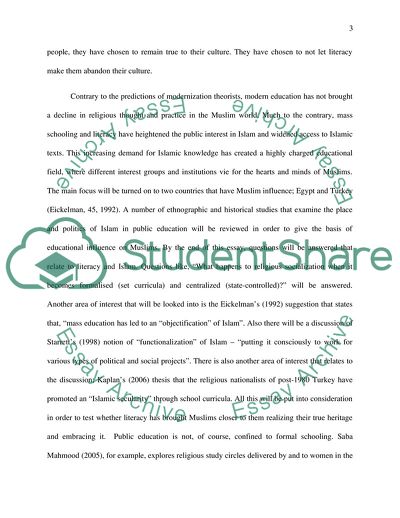Cite this document
(Mass Education and Its Relation to the Religious Observance Essay Example | Topics and Well Written Essays - 2500 words, n.d.)
Mass Education and Its Relation to the Religious Observance Essay Example | Topics and Well Written Essays - 2500 words. https://studentshare.org/anthropology/1800716-mass-education-has-not-brought-a-decline-in-religious-observance-it-has-instead-reconfigured-the-ways-in-which-muslims-know-and-perceive-islam-discuss
Mass Education and Its Relation to the Religious Observance Essay Example | Topics and Well Written Essays - 2500 words. https://studentshare.org/anthropology/1800716-mass-education-has-not-brought-a-decline-in-religious-observance-it-has-instead-reconfigured-the-ways-in-which-muslims-know-and-perceive-islam-discuss
(Mass Education and Its Relation to the Religious Observance Essay Example | Topics and Well Written Essays - 2500 Words)
Mass Education and Its Relation to the Religious Observance Essay Example | Topics and Well Written Essays - 2500 Words. https://studentshare.org/anthropology/1800716-mass-education-has-not-brought-a-decline-in-religious-observance-it-has-instead-reconfigured-the-ways-in-which-muslims-know-and-perceive-islam-discuss.
Mass Education and Its Relation to the Religious Observance Essay Example | Topics and Well Written Essays - 2500 Words. https://studentshare.org/anthropology/1800716-mass-education-has-not-brought-a-decline-in-religious-observance-it-has-instead-reconfigured-the-ways-in-which-muslims-know-and-perceive-islam-discuss.
“Mass Education and Its Relation to the Religious Observance Essay Example | Topics and Well Written Essays - 2500 Words”. https://studentshare.org/anthropology/1800716-mass-education-has-not-brought-a-decline-in-religious-observance-it-has-instead-reconfigured-the-ways-in-which-muslims-know-and-perceive-islam-discuss.


